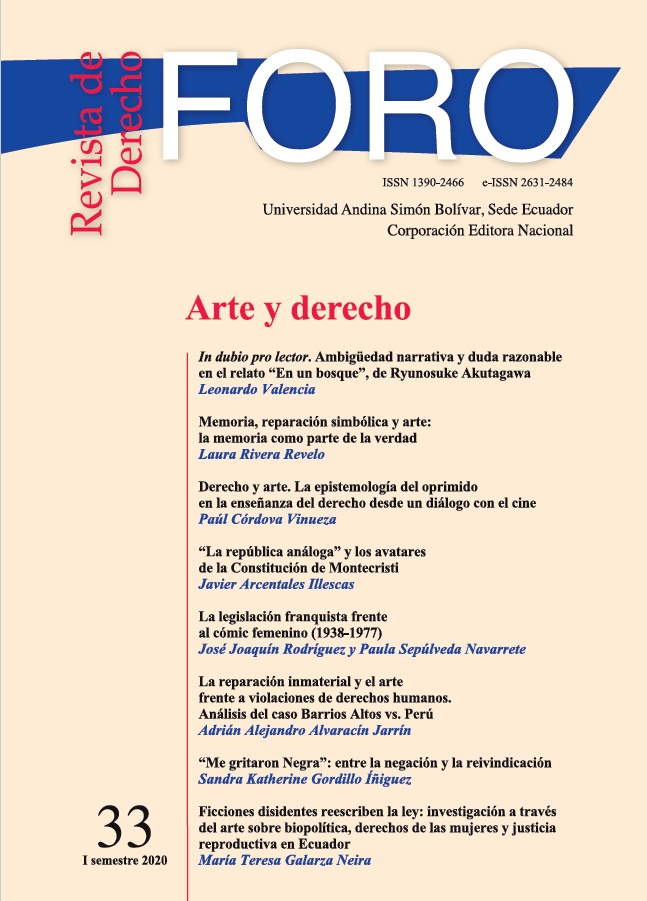Derecho y arte. La epistemología del oprimido en la enseñanza del derecho desde un diálogo con el cine
Contenido principal del artículo
Resumen
El objetivo del artículo es hacer una reinvención de las dimensiones epistemológicas que aparecen en la enseñanza y en el aprendizaje del derecho mediante el intercambio de razones críticas que se observarían con la ayuda de materiales como historias cinematográficas de casos relacionados con la aplicación del derecho.
Para ello, la discusión surgió de hacer una aproximación a dos tipos de epistemología: i) la de la dominación y ii) la del oprimido, con el fin de visibilizar que el derecho puede desarrollar un relato de enseñanza y aprendizaje en correspondencia con una de ellas. De ahí que el resultado y la conclusión consiste en que quienes participan de esos procesos pueden asistirse de experiencias humanas mediante un diálogo con historias cinematográficas para comprender las dinámicas del mundo del derecho con el fin de sensibilizar sobre sus estructuras de poder con el ánimo de repensar la vida de los oprimidos y dar respuestas a ellos desde la enseñanza jurídica, entendiendo este proceso como un medio de transformación de la cultura jurídica.
##plugins.themes.bootstrap3.displayStats.downloads##
Detalles del artículo
Sección
CESIÓN DE DERECHOS, DECLARACIÓN DE CONFLICTO DE INTERESES Y DIFUSIÓN
Los autores/as que publiquen en esta revista aceptan las siguientes condiciones:
- Los autores ceden a la Foro: Revista de Derecho, el derecho de la primera publicación. Las obras se publican en la edición electrónica e impresa de la revista bajo una Licencia Creative Commons 4.0 de Reconocimiento No Comercial-Compartir Igual 4.0, que habilita a compartir, adaptar y atribuir el trabajo (ver: Políticas de acceso abierto).
- Ver información completa de cesión de derechos, declaración de conflicto de intereses y difusión, aquí
Cómo citar
Referencias
Ávila Santamaría, Ramiro. La utopía del oprimido. Los derechos de la naturaleza y el buen vivir en el pensamiento crítico, el derecho y la literatura. Ciudad de México: Akal, 2019.
Bourdieu, Pierre. “La fuerza del derecho: hacia una sociología del campo jurídico”. En Pierre Bourdieu y Gunther Teubner, La fuerza del derecho. Bogotá: Ediciones Uniandes, 2000.
Córdova Vinueza, Paúl. Derechos sin poder popular. Quito: Centro Andino de Estudios Estratégicos / Centro de Estudios Construyendo Ciudadanía y Democracia de la Universidad Central del Ecuador, 2013.
––. “Propuesta sobre la enseñanza del derecho constitucional. Hacia una teoría de sus estudios jurídicos críticos”. Indisciplinas. Vol. 2, n.º 4 (2016).
Córdova Vinueza, Paúl, Lorena Cueva y María Paula Romo. “Debates y desafíos en la enseñanza del derecho en Ecuador”. Cuadernos del Contrato Social por la Educación-Ecuador 10 (2014).
De Sousa Santos, Boaventura. Una epistemología del sur. Ciudad de México: CLACSO / Siglo XXI, 2009.
Foucault, Michel. La arqueología del saber. Buenos Aires: Siglo XXI, 1979.
Guerrero Arias, Patricio. Corazonar. Una antropología comprometida con la vida. Quito: Abya-Yala / Universidad Politécnica Salesiana, 2010.
Kafka, Franz. El proceso. Madrid: Valdemar, 2016.
Ocampo López, Javier. “Paulo Freire y la pedagogía del oprimido”. Rhela. Vol. 10 (2018): 57-72.
Sztajnszrajber, Darío. Filosofía a martillazos. T. I. Buenos Aires: Paidós, 2019.
Thury Cornejo, Valentín. “El cine, ¿nos aporta algo diferente para la enseñanza del derecho?”. Academia. Revista sobre enseñanza del derecho, año 7, n.º 14 (2009): 59-81.
Universia. “12 películas imprescindibles para estudiantes de derecho”, 12/09/17. Madrid, España. Disponible en: ‹http://noticias.universia.es/consejos-profesionales/noticia/2015/10/28/1132935/12-peliculas-imprescindibles-estudiantes-derecho.html›. Consulta: 20 de marzo de 2018.
Wolkmer, Antonio Carlos. Pluralismo jurídico. Fundamentos de una nueva cultura del Derecho. Sevilla: MAD, 2006.
Películas
Demme, Jonathan. Philadelfia. Estados Unidos: Tri Star Producciones, 1993. DVD.
Furman, Brad. El inocente. Estados Unidos: Lionsgate, 2012. DVD.
Hackford, Taylor. El abogado del diablo. Estados Unidos: Regency enterprises, 1997. DVD.
Lumet, Sidney. El veredicto. Estados Unidos: 20th century fox, 1982. DVD.
Mulligan, Robert. Matar a un ruiseñor. Estados Unidos: Universal Pictures, 1962. DVD.
Sheridan, Jim. En el nombre del padre. Irlanda / Reino Unido: Hell’s kitchen films, 1993. DVD.
Welles, Orson. El proceso. Francia /Alemania / Italia: Paris Europa Productions, 1962. DVD.
Zinneman, Fred. Un hombre para la eternidad. Reino Unido: Highland films, 1966. DVD.


